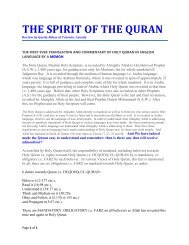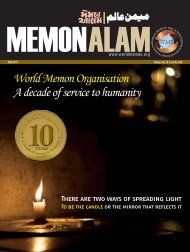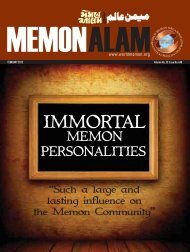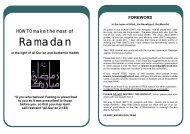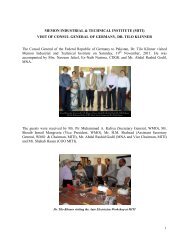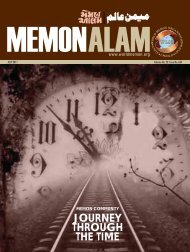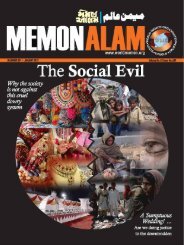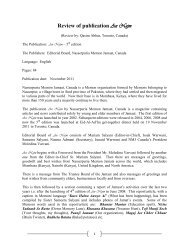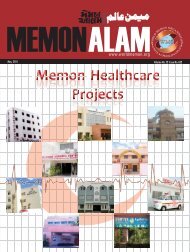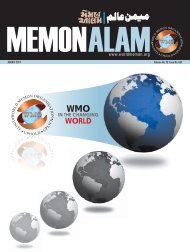WMO President's - Visit to Pakistan and India - World Memon ...
WMO President's - Visit to Pakistan and India - World Memon ...
WMO President's - Visit to Pakistan and India - World Memon ...
Create successful ePaper yourself
Turn your PDF publications into a flip-book with our unique Google optimized e-Paper software.
COMMUNITY NEWS<br />
one transmits the defective hemoglobin<br />
genes, the child may be Thalassemia Carrier.<br />
3. When both parents are carriers, then<br />
each child born <strong>to</strong> these parents has 25%<br />
chance of being healthy (without the thalassemia<br />
gene), 50 % chance of being a<br />
carrier like its parents, <strong>and</strong> a 25% chance<br />
of having Thalassemia major.<br />
4. The above figures collected on statistical<br />
basis, but, we found<br />
a. Parents having 3 children 2 are Major<br />
<strong>and</strong> one Minor<br />
b. Having 2 children <strong>and</strong> both are Major.<br />
c. Having 3 children <strong>and</strong> one is Major, one<br />
Minor <strong>and</strong> one normal.<br />
Carriers of thalassemia<br />
(minor)<br />
Individuals who inherit a normal hemoglobin<br />
gene from one parent <strong>and</strong> the defective<br />
gene from the other parent are called The<br />
Thalassemia Carrier or Thalassemia Minor.<br />
They are not patients.<br />
Carriers of the Thalassemia do not have<br />
a disease. They have no physical or mental<br />
symp<strong>to</strong>ms <strong>and</strong> do not require a special<br />
diet or medical treatment. The condition<br />
cannot become a serious disease over time<br />
– indeed, most will be unaware that they<br />
are carriers unless specifically tested. The<br />
red blood cells of these individuals are a bit<br />
paler <strong>and</strong> smaller than normal red blood<br />
cells. They are also a little anemic, but this<br />
anemia does not usually need treatment.<br />
However, they can pass on the Thalassemia<br />
gene <strong>to</strong> their children.<br />
Finding out thalassemia<br />
carrier<br />
In most cases simple labora<strong>to</strong>ry tests can<br />
identify whether a person carries the thalassemia<br />
Minor. However, before any labora<strong>to</strong>ry<br />
tests are carried out, it is important<br />
that individuals receive counseling where<br />
possible, providing them with information,<br />
advice <strong>and</strong> guidance on why they should be<br />
tested <strong>and</strong> what the results of the test will<br />
mean for them. Otherwise provision of this<br />
information should rely on a good health<br />
education program.<br />
Thalassemia major<br />
Individuals who inherit defective hemoglobin<br />
genes, one from mother <strong>and</strong> one from<br />
father are going <strong>to</strong> develop the full blown<br />
disease.<br />
Individuals with thalassemia major are<br />
unable <strong>to</strong> make the chemical needed for<br />
producing enough mature hemoglobin.<br />
Hemoglobin is essential for carrying oxygen<br />
around the body. Without sufficient<br />
hemoglobin, the body cannot carry oxygen<br />
properly <strong>and</strong> after a while the body will not<br />
survive.<br />
The patient of Thalassemia Major<br />
requires blood transfusion after every 10 <strong>to</strong><br />
20 days. Usually regular blood transfusions<br />
may damage the heart <strong>and</strong> liver <strong>and</strong> result<br />
in stunted<br />
growth, delayed puberty, diabetes <strong>and</strong><br />
other endocrine complications. Hence,<br />
drugs <strong>to</strong> reduce iron are the most important<br />
aspect of Thalassemia care.<br />
<strong>Pakistan</strong> <strong>and</strong> thalassemia<br />
In <strong>Pakistan</strong> approx. 7% of our population<br />
is Thalassemia Minor that is more<br />
than 10 million individuals; the number<br />
of minors is going <strong>to</strong> increase at least<br />
350,000 per annum. More than 6000<br />
babies are born with thalassemia major<br />
in a year. Unfortunately there is no<br />
proper report for thalassemia minor or<br />
major, all the figures are estimated <strong>and</strong><br />
base on urban studies.<br />
More than 125,000 thalassemia major<br />
patients are in <strong>Pakistan</strong>, each patient<br />
needs approx. 25 units of blood annually.<br />
They need at least 2.5 million<br />
units of blood. Blood is not easily<br />
available in our country. If any patient<br />
needs blood for transfusion then he/she<br />
have <strong>to</strong> bring a healthy volunteer blood<br />
donor. Families having thalassemic<br />
patients are facing lots of difficulties in<br />
getting blood for transfusion.<br />
How <strong>to</strong> prevent the birth of<br />
thalassemia major baby?<br />
Before marriage only the male partner<br />
can have Thalassemia Minor test, if he is<br />
normal no need <strong>to</strong> test his fiancé. But if<br />
he is positive then he should request the<br />
female partner <strong>to</strong> have thalassemia minor<br />
test. If she is negative then the couple can<br />
marry <strong>and</strong> they will pass their normal life<br />
but if the female is also positive then they<br />
should not marry. If they marry <strong>to</strong>gether,<br />
the chance of the birth of thalassemia major<br />
child will increase.<br />
Thalassemia <strong>and</strong> world<br />
memon organisation<br />
<strong>WMO</strong> is working on Thalassemia Prevent<br />
Project (TPP). The first tasks of this project<br />
is <strong>to</strong> aware general public about thalassemia<br />
<strong>and</strong> try <strong>to</strong> s<strong>to</strong>p the birth of Thalassemia<br />
Major Babies, for the purpose, <strong>WMO</strong> join<br />
h<strong>and</strong> with Husaini Blood Bank (a leading<br />
blood bank <strong>and</strong> Thalassemia Center in<br />
Karachi-<strong>Pakistan</strong>).<br />
The main objective of TPP is <strong>to</strong> identify<br />
thalassemia carriers (also called minor)<br />
individuals. Both organizations plan <strong>to</strong><br />
arrange Thalassemia Screening camps in<br />
Schools, colleges <strong>and</strong> industries. TPP plans<br />
<strong>to</strong> screen approx. 50,000 students free of<br />
charge. The cost of this project is nearest <strong>to</strong><br />
Rs. 10 million.<br />
Both organizations also joint h<strong>and</strong>s with<br />
Kashif Iqbal Thalassemia Center, Burhani<br />
Blood Bank <strong>and</strong> Al Mustafa Welfare center.<br />
For this National Cause the following<br />
companies are also supporting <strong>to</strong> TPP<br />
1. M/s Atlas Honda Limited for Blood<br />
Grouping of the students.<br />
2. M/s Saniplast providing saniplast.<br />
3. United Mobile will support in media coverage.<br />
<strong>WMO</strong> is trying <strong>to</strong> pass a resolution from<br />
Jamaats for premarital test of the couples.<br />
MEMON ALAM APRIL 2011 29



